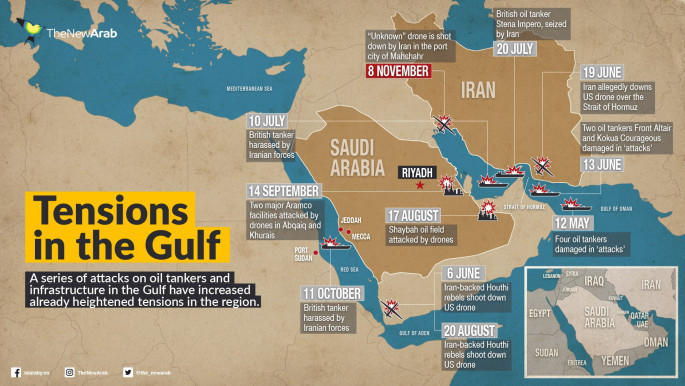Saudi FM compares 'ridiculous' regional rival Iran to Hitler
Adel Al-Jubeir made the remarks at the annual Manama Dialogue in Bahrain, where he said the region must choose between good and evil after the Sep.14 attacks on Saudi Aramco’s oil facilities.
“Appeasement did not work with Hitler. It will not work with the Iranian regime,” Al-Jubeir said.
The international community must “extract a price from Iran” for the attacks on the kingdom’s oil facilities which he claimed were “absolutely clearly” orchestrated with Iranian weapons and “came from the north and not south”.
The Strait of Hormuz, straddled between Iran and Arab Gulf states, is a strategically-significant region where around a third or a fifth of the of the world's oil passes through.
In June, two foreign tankers were attacked in Gulf waters, with Iran put forward as a culprit, while in the same month Tehran downed a US drone.
Saudi Aramco facilities were attacked with drones and missiles in September, an event that sent shockwaves through the kingdom and much of the world. Iran was again blamed for the attacks.
The events come after heightened tensions when the US pulled out of a nuclear deal with Iran last year and slapped tough sanctions on the country.
“The Iranians cannot be allowed to get away with this,” Al-Jubeir warned.
 |
The Saudi official also took aim at Iran’s foreign policy, which he slammed was based on “ridiculous” sectarianism.
“It is like Italy saying every Catholic belongs to Italy. Would Germany accept?” he said, referring to Iran’s perceived hold on Shias in the region. "What we are seeing in region is a vision of light and vision of darkness.”
‘Protecting Gulf waters’
Meanwhile, US-led naval coalition officially launched operations in Bahrain earlier this month to protect shipping in the troubled waters of the Gulf following the rise in tensions.
The coalition, aimed at warding off the perceived threat to the world's oil supply, has been in the making since June.
Bahrain, which hosts the US Navy's Fifth Fleet, joined the International Maritime Security Construct (IMSC) in August. Saudi Arabia and the United Arab Emirates followed suit in September.
Australia and Britain are the main Western countries to have agreed to send warships to escort Gulf shipping. The newest member, Albania, joined on Friday.
Vessels will be escorted through the Strait of Hormuz, the strategic chokepoint at the head of the Gulf and the main artery for the transport of Middle East oil.
Vice Admiral Jim Malloy, commander of US Naval Forces in the Middle East, said Operation Sentinel is a defensive measure aimed at protecting Gulf waters.
"While Sentinel's operational design is threat-based, it does not threaten," he said during a ceremony at the IMSC's command centre.
"We employ capable warships on patrol, but there is no offensive line of effort in this construct, other than a commitment to defend each other if attacked.
"Our commitment to the region isn't short-lived, it is enduring, and we will operate as part of Sentinel for as long as it's needed - as long as the threat looms."
Most European governments have declined to participate in the naval coalition, fearful of undermining their efforts to save a landmark 2015 nuclear accord with Iran, which was badly weakened by Washington's withdrawal last year.
Iran, which has denied any responsibility for the mystery attacks, has put forward its own proposals for boosting Gulf security that pointedly exclude outside powers.





 Follow the Middle East's top stories in English at The New Arab on Google News
Follow the Middle East's top stories in English at The New Arab on Google News
![The UAE is widely suspected of arming the RSF militia [Getty]](/sites/default/files/styles/image_330x185/public/2024-11/GettyImages-472529908.jpg?h=69f2b9d0&itok=Yauw3YTG)
![Netanyahu furiously denounced the ICC [Getty]](/sites/default/files/styles/image_330x185/public/2024-11/GettyImages-2169352575.jpg?h=199d8c1f&itok=-vRiruf5)
![Both Hamas and the Palestinian Authority welcomed the ICC arrest warrants [Getty]](/sites/default/files/styles/image_330x185/public/2024-11/GettyImages-2178351173.jpg?h=199d8c1f&itok=TV858iVg)